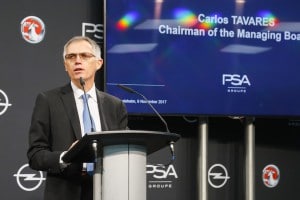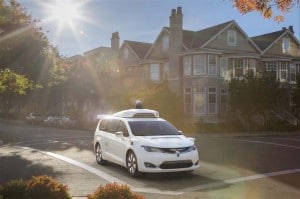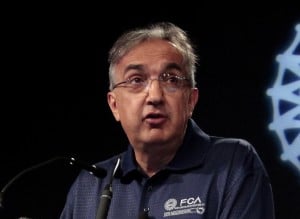
FCA Chief Exec Mike Manley agreed with his mentor, Sergio Marchionne’s view that the company needed a partner.
It pays to make friends, especially if you’re both running large corporations that could have something in common.
So it proved to be the case with Michael Manley and Carlos Tavares. When they first got to know one another a decade ago they were ambitious, fast-rising executives. Today, Manley runs Fiat Chrysler Automobiles and Tavares the PSA Group. A year from now, if all goes according to plan, they will be working for the same team, having combined the two manufacturers into what would become the fourth-largest automaker in the world, valued at around $50 billion.
TheDetroitBureau.com has confirmed that, with the blessings of the boards of both FCA and PSA, the merger will be formally announced Thursday morning in Europe. That will be followed by a Memorandum of Understanding, around mid-December. Due to the complex regulatory approvals the merger will face – along with votes by each company’s shareholders – it could take as much as a year “or longer” to complete, according to a highly-placed source with intimate knowledge of the negotiations.
(Parlez vous Francais? Here are some of the potential benefits from FCA’s proposed merger with PSA.)
Almost from the moment Fiat stepped in to bail out Chrysler following its 2010 bankruptcy, former CEO, the late Sergio Marchionne began looking for a third partner. He was summarily rejected by giants like General Motors and Volkswagen But, to some observers, a tie-up between the two companies has long been a no-brainer, the two having ties extending back to the early part of the decade, sharing some products and powertrains in Europe, among other things.
If anything, when word began to leak out last spring that FCA finally had a merger partner in the crosshairs, PSA was the first name many observers thought of. Instead, it turned out to be another French carmaker that was ready to walk to the altar, PSA’s arch-rival Renault.

PSA CEO Carlos Tavares is credited with pulling together a major turnaround since taking over the French automaker six years ago.
But it was a star-crossed love affair, and the one raising objections from the back of the church turned out to be Hiroto Saikawa, the Nissan CEO who, only months earlier, had hailed the arrest of his own mentor, Carlos Ghosn, the head of the Renault-Nissan-Mitsubishi Alliance, on corruption allegations. Worried that Nissan might try to crash out of that partnership, the French government, Renault’s biggest shareholder, tried to force a delay in the talks between the Parisian automaker and FCA. A frustrated and angry Mike Manley responded by calling the wedding off.
But, it now appears, he didn’t waste much time looking for an alternative. Within months, FCA was wooing Renault’s rival. Within just the last month or so, sources told TheDetroitBureau.com, Manley flew to Paris at least three times to get a deal into play.
It helped that he and Tavares were not only friends but, said that company source, had “a lot of similarities in their style and approach.” Both are consummate car guys. Manley loved his time as head of the Jeep brand and the ability it offered him to go off-roading. Tavares, when not at work, can usually be found at a race track, driving one of his many cars. Both men are hard driven and clear-headed. And they both know that, despite their successes, neither FCA nor PSA can go it alone in today’s increasingly difficult automotive market.
“The headwinds are intense in this industry,” said a source with ties to PSA. “From a global perspective, Carlos sees the industry under attack,” especially by regulators who are demanding hefty investments in zero-emission vehicle technology. That, he added, “is making it hard for companies to survive.”
Indeed, another insider stressed that “We didn’t have the resources” working independently, to deliver competitive autonomous and electrified vehicle technologies. Pairing up could make all the difference.
There are plenty of other areas where a partnership could pay off. In many instances, where one of the manufacturers is weak in a key market, the other is strong. Peugeot could get help, for example, moving forward on what was to be a nearly decade-long plan to re-enter the U.S. market it had walked out on a quarter-century ago. PSA could provide competitive sedan platforms should the FCA side decide it wanted to expand its meager North American passenger car line-up, while the opposite could prove true if the French side wanted Jeep platforms for Europe and other markets.
There still are obstacles that could short-circuit a deal. Most immediately, FCA will have to hope the proposed merger won’t throw its ongoing contract talks with the United Auto Workers off the rails. The union is pressing for a contract similar to what it got from General Motors that will offer plenty of cash, protect key benefits and bring the possibility of new jobs thanks to a $9 billion U.S. investment program.
With plenty of changes likely to come as PSA and FCA eventually move to meld their global operations, the UAW will “want to make sure the merger doesn’t cost jobs,” said Art Schwartz, a former GM negotiator and now head of Detroit-based Labor and Economics Associates.
The UAW won’t be alone, however. Concerns about how the proposed Fiat Chrysler/Renault deal could impact manufacturing jobs in France was a key issue for the French government, along with its concern about the Renault-Nissan Mitsubishi Alliance.

The need to fund development of autonomous and electrified vehicles was a major factor in the FCA/PSA merger.
But there’s a sense that the Paris government will be more circumspect this time around, according to sources close to the FCA/PSA talks. For one thing, at about 12%, it doesn’t hold as big a stake in Peugeot’s parent, and there are other major shareholders who could challenge the government, including Chinese automaker-cum-PSA-investor Dongfeng, as well as the founding Peugeot family.
And in the wake of the criticism the government got after scuttling the Renault merger, they have “learned their lesson” having gotten “hit with a lot of brickbats for screwing up the last one.”
(How the French and Japanese governments scuttled the FCA/Renault merger.)
Anti-trust regulators could pose another threat, the deal facing aggressive vetting in Europe, the U.S. and, perhaps elsewhere.
But, among those insiders TheDetroitBureau.com spoke to, there is a sense of confidence that this time, after nearly a decade of hunting for a partner, FCA finally has one willing to go all the way down the aisle.
(New Nissan CEO will have to restore trust, confidence among workers, investors, customers.)


Curious to see how this plays out. It will take more than a long friendship to move forward on this merger. Though their valuations are equal it does not mean it will be a “merger of equals”.
Hopefully in the midst of all the optimism there will be the correct amount and type of pessimism so that the deal is truly best for both sides. I hope this isn’t being led by just “needing” to jump on the electric / autonomous band-wagon by FCA.
Will be interesting to follow this over the next year